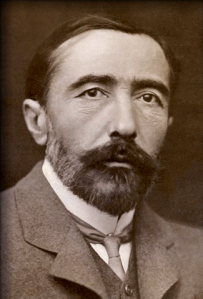
Under Western Eyes by Joseph Conrad
My rating: 4 of 5 stars
Betrayal. It’s an ugly idea that someone you trust would behind your back act against you. What Dostoevsky does with the idea, act and subsequent guilt of murder in Crime and Punishment, Conrad explores here around the idea of betrayal.

Our main character, Razumov, is an orphan sponsored silently by Prince K___, of the Russian nobility, as a student. Dark, quiet, studious, and a listener, he finds himself entrusted with the safety and escape plans of a fellow student, Victor Haldin, who has just assassinated a Russian official. He shares none of Haldin’s revolutionary presentiments, and sees his hope of a successful career vanishing to be replaced with a prison sentence in Siberia. Failing to arouse the peasant worker Ziemianitch to transport Haldin out of Russia, he decides to go to the authorities and betray the location where Ziemianitch was to pick up Haldin. Haldin is arrested, and executed. It would seem that Razumov can resume his life.
Conrad reveals how betrayal comes at a cost. For one thing, there is the “phantom” of Haldin that dogs Razumov’s steps throughout the story and the repeated effort to “step on” the phantom, to obliterate him. Then, because Razumov was never identified as the betrayer (and the remorseful death by hanging of Zemianitch suggests that it was he), Razumov is recruited to infiltrate the revolutionary circles abroad because he is assumed by them to be a friend and revolutionary associate of Haldin’s, indeed the last to see him living. He succeeds in insinuating himself into their circles, but as he does so he comes in contact with Haldin’s sister Nathalia under whose “gray, trustful eyes” he falls, and those of her mother, shattered by the loss of her son. He also comes under the eyes of the English (hence Western) narrator who is Nathalia’s English teacher.
The plot tension surrounds whether Razumov will be able to keep up the ruse, and betray yet more of these revolutionaries to the Russian authorities (betrayal leading to yet more betrayal) or whether the knowledge of what he is done and the duplicity he is practicing will become too great for him.
The device of the western observer who tells this story seems awkward and somewhat extraneous to the plot movement. Otherwise, this is a fascinating study of the psychology of betrayal. It also chronicles czarist Russia’s corrosive abuses of power that led to the Marxist revolution. In the variety of characters in the revolutionary circle Conrad also gives us a portrait of the mix of the noble, venal and violent qualities of the regime that took its place.
Thank-you to Bob Trube for sharing reviews from Bob on Books with the Emerging Scholars Network Blog. His insights are much appreciated. To God be the glory! ~ Thomas B. Grosh IV, Associate Director, Emerging Scholars Network
Bob Trube is a former Associate Director of Faculty Ministry and Director of the Emerging Scholars Network. He blogs on books regularly at bobonbooks.com. He resides in Columbus, Ohio, with Marilyn and enjoys reading, gardening, choral singing, and plein air painting.

Bob, Your review of Under Western Eyes:
1. triggered reflections upon the complexity and depth of the practice/reception of betrayal in the fallen creation/relationships in which we dwell,
2. led me to self-examination and prayer,
3. prompted me to extend prayer to members of InterVarsity Christian Fellowship (students, staff, faculty, alumni, etc) to be true to the Lord each and every step of our days across the various structures/relationships in which we find ourselves called to serve,
4. reminded me that loving God with head, heart, and hands “fleshed out” by loving our neighbor (and the very creation) offers daily evidence of (and testimony to) the counter-cultural nature of the Kingdom of God . . . extending shalom* in the face of great individual/corporate, internal/external challenges. What a joy to be embraced by and step out in the reality of the grace of God as part of the people of God. To God be the glory!
Thank-you for digging into Joseph Conrad’s Under Western Eyes.
Come, Lord Jesus! Come!
*Thank-you to John Mulholland for his significant focus upon shalom at The Charles Malik Society for Redeeming Reason (Facebook group).
Tom, thanks not only for posting this review but for your thoughtful comments. What is striking is that Conrad himself, who does not evidence a Christian faith, evidences no hope for redemption or grace for his central character.